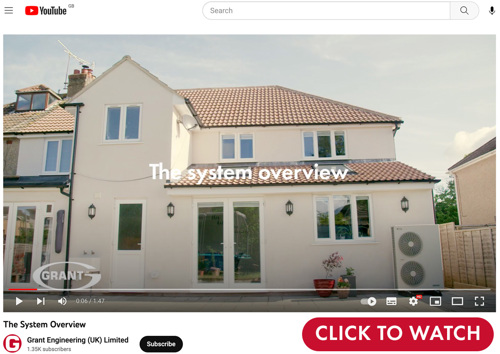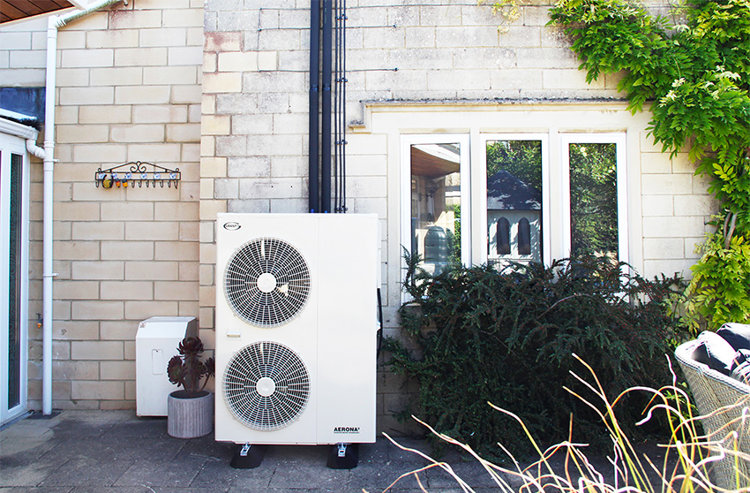If you are looking to change and upgrade your home heating system, the decision may seem a daunting one. Air source heat pumps are one solution that could fulfil your home’s heating and hot water demand so let us help you make an informed choice about whether this low carbon heating system is the right option for your home.
Air source heat pumps (ASHPs) are an eco-friendly alternative to conventional, fossil fuel heating solutions. Working in a similar way to a refrigerator but in reverse, air to water heat pumps transfer heat energy from the surrounding air outside and transfer this energy into your home to provide space heating and hot water. We are often asked many questions about air source heat pumps so here we have shared some of the answers which may help your understanding of this low carbon heating technology.
For more information on ASHPs, please visit our dedicated FAQ content.
View our air source heat pump range to learn more about our low carbon heating systems.
Q1. Is a heat pump right for my home?
An air source heat pump is suitable for most types of properties but one of the key factors that will help you decide whether a heat pump is right for your home will be the current level of heat that is escaping through your roof, walls and windows.
Is my home well insulated?
As heat pumps are low temperature systems, it is important that any heat loss from your home is minimised and this can be achieved with suitable levels of loft insulation, double glazed windows and wall insulation. Typically, a home built since the late 1990s will be sufficiently insulated and suitable for a heat pump. An accurate heat loss calculation should also be used to help determine the suitability of a property for an air to water heat pump. You can read more about energy efficiency measures for your home here.
Q2. What financial support is available?
Government funding is available to support homeowners who want to install renewable energy systems or energy efficiency measures into their home.
The Boiler Upgrade Scheme provides eligible homeowners in England and Wales with a grant of up to £7,500 if they replace their gas or oil boiler with an air source heat pump. In addition, certain types of energy saving materials, such as heat pumps, are currently eligible for a zero rate of VAT. Please click here to read more about these financial initiatives.
Q3. How do they work?
Air source heat pumps use the heat energy that is contained within the air and they convert this into energy that can be used within your home to heat it. We provide a more in-depth introduction to how air source heat pumps work in our Education Zone.
Q4. How much does it cost to install an air source heat pump?
Every installation is different so calculating an average cost of a heat pump installation is difficult – the Energy Saving Trust provide an estimate from £7,000 up to £13,000.
For homes which do not require additional insulation measures, the installation costs will be lower than a property which may need loft or wall insulation installed. We recommend that homeowners contact a few local G1 Installers in their area to obtain quotations – installers will be able to assess your property’s build type and heating requirements to then give you an accurate estimate of costs for your home’s system. Use our easy to use search tool to Find an Installer.
Q5. What size air source heat pump do I need?
To determine the size of heat pump you will need, a heat loss calculation must be carried out on your home which your installer will do. This calculation will work out the amount of space within your home that needs heating as well as calculating the amount of heat that is being lost from your home. The outcome of this calculation will determine the heat output required from your heat source, whether that be a 6kW air source heat pump or a 17kW air source heat pump for example. It is vitally important that the right size of heat pump is selected for your home and we explain this in greater detail our Home Heating Blog.
Q6. Do I need planning permission to install an air source heat pump?
In most instances planning permission is not required because an air source heat pump installation is considered permitted development provided certain conditions are met. Provided the size of the heat pump’s outdoor compressor unit does not exceed 0.6 cubic meters and provided the heat pump unit complies with MCS Standards, installing a heat pump should not require planning permission. For example, all of Grant’s Aerona³ heat pumps meet these conditions so their installation falls within permitted development. It is always recommended to check with your Local Authority Planning Department to ensure that you are complying with their requirements.
Q7. Do they make a lot of noise?
No. A common misconception about air source heat pumps is that they are noisy but, as long as they are installed correctly (for example, fitted on anti-vibration feet and on a level surface), heat pumps today operate quietly. Grant’s Aerona³ 13kW and 17kW air source heat pump units both have the Quiet Mark which acknowledges their very quiet operation. Follow the link here to learn more about how quiet air source heat pumps are and to watch (and hear) a Grant heat pump in action.
Q8. Do they work effectively in the winter?
Yes. Provided your heat pump has been correctly installed and the system correctly sized, a heat pump will work effectively during the colder months of the year. Grant’s Aerona³ air source heat pumps have built-in frost protection and they have been designed to operate in air temperatures from -20ºC up to 43ºC. Please visit our YouTube to watch a handy tutorial which explains the energy usage of heat pumps in more detail or read our heat pump myths article here.
Q9. Will I need a secondary heating source?
In most instances, no, you will not require a secondary heat source. Larger properties or properties with lower levels of insulation may require an additional heat source and this is where hybrid heating technologies can be installed. Hybrid products combine an air source heat pumps with a fossil fuel boiler, such as an oil boiler. Read more about hybrid heating technologies here.
Q10. Are they future proof?
Yes. Air source heat pumps are growing in popularity and will be a core part of home heating systems as we all transition into a low carbon and ultimately net zero world. Air source heat pumps can also be easily integrated with other products, either in hybrid installation scenarios (as mentioned above) or with technologies such as solar thermal systems so a heat pump can help you significantly reduce your dependency on fossil fuels.
Get started in your air source heat pump journey
You can start your journey into heat pumps by discovering the Grant Aerona³ air source heat pump range here. To find local heat pump installers in your area, please use our Find an Installer online search.

